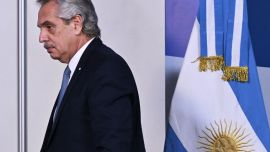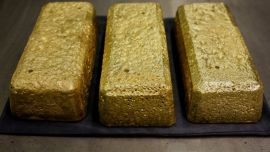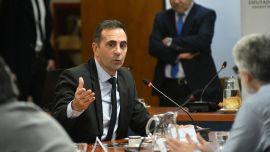“We need to do this seriously, Mr. President,” Alberto Fernández told Mauricio Macri during the first of the two televised presidential debates that took place earlier this month. “It’s not enough with photo-ops and a G20 summit.”
The person most likely to be elected as the country’s next president has not run a foreign-policy focused campaign. But with a very weak economy, mounting debt, shrinking Central Bank reserves, a record bailout package from the International Monetary Fund to take care of and a troubled region with rising unrest, many are now wondering what exactly the foreign policy of Fernández-led administration would look like.
“Alberto Fernández has given very few clues that could lead to a comprehensive approach to diplomatic policies,” Rafael Gentili, president of the progressive Laboratorio de Políticas Públicas (LPP) think-tank, told the Times.
Some moments during the campaign, however, hinted at an approach, such as his trip to visit Spain and Portugal after the PASO primaries.
“If we were to interpret some of the hints he gave, we could assume his focus would be on the European Union and no longer on the United States, with progressive governments from the Iberian Peninsula and [Spanish politician and] future EU high-representative Josep Borrell as his privileged partners,” explained Gentili.
Most analysts believe that the Frente de Todos candidate, widely seen as the leader of a centre-left coalition with leftwing components, will have no choice but to sit down and sort things out with Donald Trump.
“The United States was a key actor in convincing [and imposing] a sceptical IMF board over the stand-by agreement with Argentina and there’s no way a new deal can be agreed without that support,” Gentili said.
Last week, the Infobae news portal reported that Edward Prado, the US ambassador to Argentina, had began chatting with Fernández and had asked Jorge Argüello, a former Argentine ambassador in Washington and key adviser to the presidential candidate, to organise an under-the-radar meeting with Fernández running-mate, the divisive Cristina Fernández de Kirchner. Contacted this week by the Times, Argüello declined to comment before the electiontakes place.
“The Fernández-Trump relationship will be indispensable,” Andrés Malamud, a senior research fellow at the Institute of Social Sciences of the University of Lisbon, told the Times. “Without the US there is no IMF, and without the IMF, the country goes into default,” he added.
Gentili, a former Buenos Aires City lawmaker for Movimiento Proyecto Sur, said that for all the rhetoric surrounding Fernández most of his allies are well aware of the fact that the only alternative is pragmatism.
“It’s not only Fernández’s own instincts — the [Peronist] governors supporting his candidacy and Sergio Massa’s Renewal Front are far from being anti-American,” the political analyst explained.
Indeed, Massa is a man with ties in Washington, including a relationship with former New York City mayor Rudy Giuliani, who now – conveniently – serves as Trump’s personal attorney.
To complicate things even further, the US is currently waging a trade war with China that may have dire consequences on the economy and an unpredictable impact on financial markets. In this context, foreign policy choices are not neutral: as political tectonic plates are shifting, a potential Fernández presidency would have to decide the nature of the country’s relationship with Chinese leader Xi Jinping.
“If we don’t have a good relationship then it would be a stupid one,” Malamud said. “China is one of the two world superpowers, and a peripheral and vulnerable country like Argentina must diversify its foreign and commercial policies in order to prosper.”
Gentili believes that the relationship between the probable new government and the Asian giant and will be both “tight” and “discrete,” oriented toward maintaining Chinese commitment in a number of key areas: the currency swap between the Argentine Central Bank (BCRA) and the People’s Bank of China, the construction of a new nuclear plant in Buenos Aires Province, hydroelectric projects in Patagonia and a number of investment projects in lithium, oil, gas and mining.
“All of these without trying not to upset the US,” reflected Gentili, the LPP president.
A TROUBLED REGION
A crucial ingredient in foreign affairs will be the countr y’s official stance towards Venezuela amid Trump’s “maximum pressure” campaign to unseat Nicolás Maduro, the authoritarian ruler of the Caribbean nation.
Earlier this month, Fernández vowed to abandon the Lima Group, a multilateral body that seeks to up global pressure on Venezuela’s Maduro with the sole mission of regime change. That body was instrumental in the recognition of National Assembly chief Juan Guaidó as the troubled-country’s legitimate leader.
When asked for further elaboration on his position, the Peronist candidate said he admired the stance adopted by Uruguay and Mexico, a more neutral position that calls for increased diplomatic pressure regarding the violation of human rights by the Maduro government, while ruling out any kind of foreign military intervention in the country.
“President, I hope no Argentine soldier ends up on Venezuelan soil,” Fernández declared on October 13 during the presidential debate in Santa Fe.
According to Gentili, it’s still too early to tell whether the frontrunner’s attitude towards Maduro once he reaches the Pink House will be closer to the tough line of national lawmaker Sergio Massa or the lukewarm support of the regime stemming from the Kirchnerite youth group La Cámpora, whose leaders claimed that the Maduro government was “not a dictatorship” and that the violence on the streets of Caracas could be explained as the result of a failed coup d’état orchestrated by the US.
“Venezuela will be an uncomfortable subject due to the lack of internal agreement among Frente de Todos leaders,” the LPP president said.
“If the Frente Amplio achieves its re-election in the upcoming Uruguayan elections, we may expect the ‘critical’ line to win and see come pressure against Maduro regarding the democratisation of Venezuela and the denunciation of human rights abuses in the country. If it doesn’t, the Argentine government may lose interest in the subject because of the lack of regional partners that could help them outline a critical position palatable to Cristinistas.”
Malamud had a more detached view of the Venezuela issue, saying the Argentine position regarding the Venezuelan crisis has “little significance in geopolitical terms” and that the closer ties with the Latin American left will be necessary to “compensate in symbolic terms for the austerity measures that will have to be adopted” by the new government.
As neighbouring Chile faces the worst social unrest since the dictatorship of Augusto Pinochet. Fernández is also strengthening ties with Marco Enríquez-Ominami, a progressive and three-time presidential candidate.
Fernández and Enríquez Ominami were some of the founders of Grupo Puebla, a group of centre-left leaders that includes former presidents Rafael Correa from Ecuador, Fernando Lugo from Paraguay, the Brazilians Dilma Rousseff and Luiz Inácio Lula Da Silva, as well as Spanish leader José Luis Rodríguez Zapatero.
The first meeting of Grupo Puebla took place in Mexico in July, with the presence of a number of close Fernández allies such as Carlos Tomada, Jorge Taiana and Felipe Solá.
According to Revista Noticias, a second meeting is expected in Buenos Aires next month and Fernández could be among the participants.
A shift left will not please everyone in the region. A further problem for Fernández, Gentili added, is that the Peronist leader’s idea to strengthen the Mercosur trade bloc that Argentina shares with Brazil, Uruguay and Paraguay. This “will be difficult with Brazil ruled by [right-wing leader Jair] Bolsonaro and [his Economy Minister Paulo] Guedes.”
Bolsonaro, Brazil’s outspoken and controversial leader, will be a problematic issue for the frontrunner, should he win the election. Earlier this week, the far-right president threatened to slap Argentina with sanctions from the Mercosur, should Fernández seek to shift the trade bloc away from free trade and back toward protectionism.
A Frente de Todos victory “would jeopardise all of Mercosur,” Bolsonaro said during comments in Japan, invoking the previous expulsion of Paraguay from the bloc in 2012 as precedent. My role is “not to facilitate the formation of a Bolivarian movement on the left, but to open the market for global commerce,” he added.
Reports in the Brazilian press this week said tensions with a Frente de Todos government were sure to generate doubts about the historic trade agreement between Mercosur and the European Union, one of President Macri’s major foreignpolicy accomplishments. And that’s not the only issue likely to create tensions.
THE MALVINAS ISSUE
Over the last four years, relations with the United Kingdom have greatly improved, especially given the less confrontational stance adopted by Macri since he took office in 2015. The issue of the disputed Malvinas (Falkland) Islands has been less of a hot potato, unlike in the latter years of the Cristina Fernández de Kirchner governments, when the topic regularly made the headlines.
With that in mind, it may have come as a surprise that the part of the first presidential debate dedicated to “international relations” was plagued with references to Malvinas, made by not only by Macri and
Fernández but also by other presidential contenders such as Roberto Lavagna, Juan Gómez Centurión and José Luis Espert. Fernández broke his silence over the Malvinas issue, saying he aimed to end what he saw as a perceived lack of progress on the sovereignty dispute under the Macri administration.
“During these years the government was very busy trading with Britain and forgot about our sovereignty over the Malvinas. But we will insist again. In memory of those soldiers, I’ll make sure things are different,” the Peronist contender exclaimed.
A clear break with previous position. But what does this mean, exactly?
The LPP headed by Gentili foresees “a strategy of sovereignty rhetoric without abandoning completely what Macri has achieved,” reaching a certain plateau but with no further progress. “That being said, we don’t rule out the Malvinas issue being a handy issue to bring up if the economy or other domestic issues take a turn for the worse,” the analyst said.
Ricardo Kirschbaum, the general editor of the Clarín newspaper, wrote an op-ed along that same line last Saturday, saying that reviving the issue of sovereignty “could serve as a diversion from the serious economic difficulties and the painful decisions that the government may have to take.”
For Malamud, the country won’t find any material rewards in Malvinas, at least in the short run, with goals that can only be symbolic or part of a long-term strategy. “In both cases I expected some difference in attitudes, but not in results, regarding the policy adopted by Macri,” he said.
Much, it seems, is still to be defined. Come Monday morning, we should start to get a clearer idea of things.






















Comments